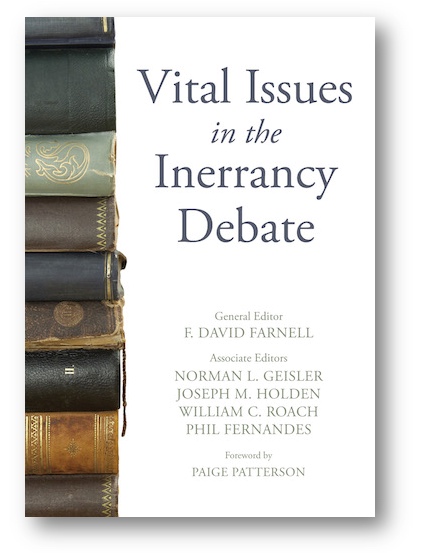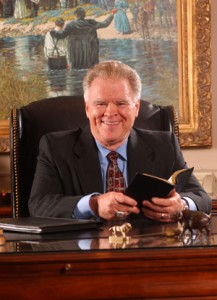Announcing Our New Book
We are excited to announce the release of our new book, Vital Issues in the Inerrancy Debate. Get the book 40% off from Wipf & Stock by clicking here. Be sure to enter coupon code “inerrant” during checkout.
You can also preview the book and order from Amazon by clicking here.
Paige Patterson explains the importance of this new book
Mark Twain was not a theologian, but he was a shrewd observer of life on the Mississippi River. And one thing that you never read in his novels is a pericope about a loosely tethered boat slipping the knot and drifting upriver to some mysterious location. As certain as anything in this life can be, all that is adrift on the mighty Mississippi is headed south. If you want to go upriver there must be deliberate propulsion and guidance. Such an observation requires only the opportunity to reflect for a few days on the flow of the river. Only a fool would attempt to sustain the case that things quite frequently drift upriver.
F. David Farnell and Norman Geisler, together with a cast of highly credible thinkers, understand that pedestrian avowal and know that the same forces are at work in theology. Vital Issues in Inerrancy is the resulting volume unveiling the sorrowful journey of dozens of “theological boats” that have slipped their logical and spiritual knots and are now drifting south on the “River of Doubt.” The authors reset this strategic doctrine, setting the parameters both for what qualifies and for what does not meet the standards for biblical inerrancy.

But why is such a book necessary? Isn’t this thrashing the proverbial dead horse? When the International Council on Biblical Inerrancy (ICBI) was functioning in the late ’70s and ‘80s, there was a lively discussion among the members of the board about the future of the organization. Some saw the need for the organization to exist in perpetuity. Others of us feared the prospects of an organization that could become another parachurch ministry furthering the departure of talent and resources from the local churches in America. We suggested a ten-year limitation with a sunset clause in place to guarantee a concluding date. An incredible number of critical texts penned during those ten years contributed heavily to the reversals in the Missouri Synod Lutheran Church and most dramatically in the Southern Baptist Convention.
While I remain confident that a limited period was appropriate, the volume that you hold in your hand or view on the screen is a testimony to two things. First, the ICBI shut down, but the need for continued vigilance is unmitigated. Second, the amazing tendency on the part of “evangelical scholars” to follow the line of least resistance and drift away from biblical theology is continuing to the sorrow of the church of God. I used the word “amazing” because the history of the effects of biblical scholarship hinged to historical-critical interpretation is the history of decimated congregations and evangelistic and mission stagnation. This is so obvious as to need no elucidation.
Regrettably, the younger generation does not read nearly as prolifically as former generations. So most are simply unaware of Gerhard Maier’s The End of the Historical-Critical Method. They have not read the arresting articles from Norm edited volume titled Inerrancy. They remain blissfully unaware of Laird Harris’ work on Inspiration and Canonicity of the Bible. Although the book is enough for anyone to read, few have heard of the early Clark Pinnock’s magnificent 1967 treatment of A Defense of Biblical Infallibility. D. A. Carson and John Woodbridge examined Scripture and Truth in 1983, but a fair number of the young future pastors were just being born about that time. And hardly any of the younger set has carefully considered Carl F. H. Henry’s fifteen wonderfully crafted theses articulated convincingly in the first sixteen pages of God, Revelation and Authority, vol. 2. In own Southern Baptist denomination, there is little consciousness of editors Robison B. James and David S. Dockery’s revealing work Beyond the Impasse? which contrasts the difference in believing and unbelieving perspectives with clarity. And, of course, this is to name but a few of the convincing tomes penned on this subject.
There are better reasons to revisit the subject. The earliest attack in Eden appears to be directed at the possibility that God had spoken a clear, definitive, cogent, and permanent word: “Has God said?” What began there continues relentlessly through the ages, whether it be an early attack on the historicity of Daniel by Porphyry or the most recent attack on the historicity of Matthew 27:52-53 by Michael Licona in The Resurrection of Jesus (2010). Of course, Licona wants to have his cake and eat it also, but the verse cannot at the same moment both describe a reality and be dismissed as Midrash. The point is that every generation has to answer this issue for itself. This current treatise engages the postmodern with the claims of inerrancy and documents in a kind but firm way those evangelical voices damaged by compromise with the culture and the academy.
All associated with this book wish that it were not necessary. Like Jude, much rather have written concerning “our common salvation.” Unfortunately, in every generation, Satan must attack the doctrines of revelation, creation, the person and work of Christ, and the consummation of the kingdom. as believed and taught by the apostles, then Satan’s efforts to destroy the church surely fail. The authors of this volume understand that they must contend for the faith once delivered to the saints. And that faith begins with a sure and certain word from God.
May God be pleased to bless these pages for the edification of the young church today. And may the end result be the opportunity for all seven billion of this world’s teeming population to hear the message of the unsearchable riches of Christ.
Paige Patterson
President, Southern Baptist Theological Seminary
Ft. Worth, Texas















